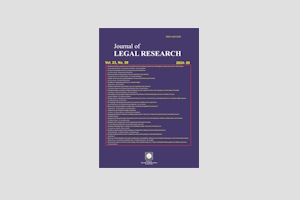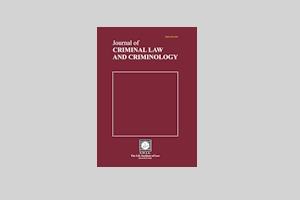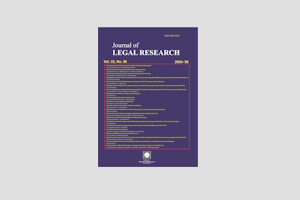Journal of
LEGAL RESEARCH
Number 22
Vol. XI ● No. 2
Autumn 2012– Winter 2013
Managing Editor: Vahid Eshtiagh
Editor-in-Chief: Seyyed Ghasem Zamani
CONTENTS
Articles
Recognizing the Concept of ‘Foundations’ in Legal Studies
Abbas Mansoorabadi (Ph.D.) & Javad Riahi
Extradition in the Practice of Europen Court of Human Rights and Human Rights Committee of UN
Saeed Bagheri
Electrify of Judicial System in light Patterns of Good Governance
Samaneh Rahmatifar
The Role of NGOs in Human Rights Protection in ECHR Practice
Armaghan Abiri
Cancellation as Instance of Impeachment: Investigating Judgment of General Board of Court of Administrative Justice about Managing Director of Social Security Fund
Majid Banaei oskoei (Ph.D.) &Vahid Agah
Assessment of the Legal System Governing Construction Torts
Zeinab Taghidoost
ICC Paralegal Protections from Crime Victims
Marziyeh Dirbaz
A Legal scrutiny through the First International Criminal Court regarding the Enlisting and Conscripting the Child Soldiers in National or International Armed Conflict
Zakiyeh taghizadeh & Fatemeh Hadavandi
Articles
Recognizing the Concept of ‘Foundations’ in Legal Studies
Abbas Mansoorabadi (Ph.D.) & Javad Riahi
Abstract:
The term “foundation” is one of the words that commonly used in legal studies. Lawyers, however, have no consensus about the interpretation of this word and about the explanation of its meaning. This study attempts to indicate that concepts of “compulsory power” and justification of validity” are more justifiable than others through examining the lawers’ interpretations.It also tries to determine differences between word foundation and its similar word through comparing their meanings.
Besides, it examines a number of legal studies using the word foundation.
In this way, it distinguishes the most prevalent meaning of foundations and some of its factors and referents.
Keywords: foundation, Compulsory Power, Principle, Justification of Validity, Sources of law.
Extradition in the Practice of European Court of Human Rights and Human Rights Committee of UN
Saeed Bagheri
Abstract:
Extradition is one of the most important instances of judicial cooperation’s between states that have considerably been influenced by the International Human Rights Law. Doubtlessly, the basis of commitment to the principles of human rights, is inventing a solution for creating equilibrium and balance between the public interests of the international community on one hand and the accessories of supporting the fundamental rights of individuals on the other. Pertaining to the mentioned issue, this article intends to specify the impact of international human rights on extradition process by observing the practice of the European Court of Human Rights as the most important judicial institution of human rights in regional scales and the practice of Human Rights Committee as the quasi-judicial body of the UN.
Keywords: Human Rights, Extradition, Extradition, European Court of Human Rights, Human Rights Committee
Electrify of Judicial System
In light Patterns of Good Governance
Samaneh Rahmatifar
Abstract:
Advancement of information and communication technology and its arrival to the State transaction is leaded to emerging electronic government. in this context, judicial system has important role because of its Position in the realization, Preservation and promotion of human rights and also for having the most facilities to violate citizens’ rights.
Just the reforms, therefore, are suggestible which improve the relationship between judicial and citizens, This paper examines the influence of IT on the judicial system and its positive and negative impacts on the quality of judicial processes in the light pattern of good governance.
Keywords: Electrify, Electronic Government, Good Governance, Fair Trial.
The Role of NGOs in Human Rights Protection in ECHR Practice
Armaghan Abiri
Abstract:
Seems to be doubtless, in recent decades, it has been demonstrated that NGOs, as well as actors and individuals, have the possibility to act as amici curiae before several international and regional courts. Different courts, however, make different use of the rules on submissions from non-parties, Regarding the importance of such issue in international era, in this article, at glimpse, our aim is to investigate the present legal status of non-governmental organizations (NGOs) in ECHR procedure and to discuss this status in relation to the functioning and legitimacy of the international legal system.
Keywords: NGOs, Human Rights, Amici Curiae, European Court of Human Rights, Amnesty international.
Cancellation as Instance of Impeachment: Investigating Judgment of General Board of Administrative Justice about Managing Director of Social Security Fund
Majid Banaei Oskoei (ph. D.) & Vahid Agah
Abstract:
Appointment of ex-public and revolutionary prosecutor of Tehran to managing director of social security fund was seriously criticized by Parliament and it was requested from the Minster of Cooperative for his dismissal. Minister reject this issue and he was gone under impeachment at Parliament, finally the decision of impeachment was rejected and Parliament instead of continuing political control, assigned this issue to The Judiciary and General Board of Court of Administrative Justice. By virtue of Written verdict No. 261 dated July 30, 2012 this appointment Was cancelled; In which, is regarded as exception case in history of Court of Administrative Justice. This article investigates validity of judgment in administrative law system of Iran and ambiguity in competence of general board and even regarding written verdict as the only judicial review on acts of government. By hoping competence of branches of Court of administrative Justice for investigating such lawsuit in relation to interpreting public interest and applying rule of law upon amending act of this court.
Keywords: General Board of Court of Administrative Justice, Impeachment, Competence, Suspension, Social Security Fund.
ICC Paralegal Protections from Crime Victims
Marziyeh Dirbaz
Abstract:
Crimes subject to the jurisdiction of International Criminal Court –
Genocide, crimes against humanity, war crimes & aggression – have very Large numbers of victims. Crime victims are demanding a board and diverse support of the Court to reduce the harms arising from crime. Paralegal supports mention to different types of crime victims
Protections, outside the scope of legal protections and mechanisms are foreseen in the Criminal Procedure. These protections are explained in the light of international criminal court provisions and in two parts; emotional protection & social protection.
Keywords: Protective Victimology, International Criminal Court, Paralegal Protections, Emotional Protection, Social Protection.
A Legal Scrutiny through the First International Criminal Court regarding the Enlisting and Conscripting the Child Soldiers In National or International Armed conflict
Zakiyeh Taghizadeh & Fatemeh Hdavandi
Abstract:
Enlisting and conscripting the “ child soldiers” in International or Non-
International Armed Conflicts is a tragedy which has surviving all through the 21th century despite of all great enormous development of human being in this sense. Children are the Victims of Such a sad tragedy; they are being taught by governmental personnel of militias as well to fight over the supposed enemy. However, enlisting and conscripting children under the age of fifteen years by political groups is a prohibited act according to Article 38 of Convention on the Rights of the child (1989). In addition, having considered further numbers of protected subject, article 4 of the Optional Protocol to the CRC on the Involvement of children In Armed Conflict establishes eighteen as the minimum age for compulsory recruitment and participation In hostilities. Furthermore, these measures were condemned within the meaning of articles 8 (2)(b)(xxvi) and 25 (iii)(a) of the Statue of the ICC. The importance of criminalizing the enlisting for the ICC was so great that the court delivered its first judgment regarding the situation In the Democratic Republic of Congo In the case of the “Prosecutor v.Thomas Lubanga Dyilo” on 14th March 2012 mainly in the charges of enlisting and conscripting children under the age of fifteen years into the FPLC and using them to participate actively in hostilities from a certain period, early September 2002 to June 2003: |He was convicted to lifetime imprisonment on these grounds. Within a very short period ,just right after delivering this judgment, International Court of Sierra Leone has issued a similar judgment on 16 th April in this regard. This article presents an overview of the established legal framework for protecting the child soldiers in international law of armed conflict. It also discusses the experience and practices of the International Criminal Court concerning the issue of children and crimimnal responsibility. This paper further elaborates on the precise role and upcoming place of the ICC in establishing a new judicial precedent dealing with the phenomenon of enlisting child soldiers.
Keywords:.Child Soldiers, Right of child, Enlisting and Conscripting, International Criminal Court, International or Non – international Armed conflicts





